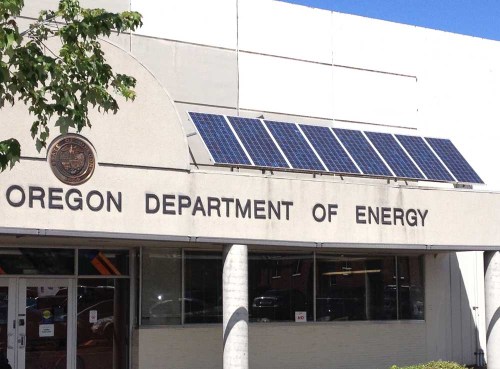Energy tax credit program yielded untaxed gains
Published 1:13 pm Tuesday, June 23, 2015

- Business Energy Tax Credits issued by the Oregon Department of Energy produced untaxed capital gains the state is still trying to resolve.
SALEM — Auditors at the Oregon Department of Revenue in 2012 were told to ignore problems they found with the state’s business energy tax credit, or at a minimum not to scrutinize them too closely.
The state issued the tax credits to owners of renewable energy and efficiency projects. Project owners could use the credits to offset their taxes, or sell them at a discount to raise capital. Those sales produced a capital gain for the purchaser.
Auditors discovered purchasers were not paying taxes on those gains, which for some taxpayers amounted to more than $1 million. Auditors wanted to put energy tax credits under a microscope, with a specific project to look at tax returns of individuals and corporations that claimed the credits.
Instead, Oregon Department of Revenue director Jim Bucholz told auditors to hold off because the Kitzhaber administration planned to push for a bill in the 2013 legislative session that would retroactively make investment profits from the tax credits non-taxable in Oregon.
That bill died in committee, but the situation apparently had a chilling effect at the Department of Revenue. The agency never moved ahead with a project focused on energy tax credits, despite finding problems on 21 tax returns claiming business energy tax credits that were audited for other reasons since July 2013.
Around the same time, the Oregon Department of Energy also scaled back its oversight of the tax credit sales. The department quietly stopped enforcing pricing and other rules for the sales in fall 2011, which allowed private brokers to strike deals in which the prices were never verified by the state.
The Department of Energy has struggled to track the private deals, including verifying who was entitled to the tax breaks and how much they paid for them.
Anthony L. Buckley, chief financial officer for the energy agency, was reluctant to say the buyers and sellers of tax credits have reported all those transactions to the Department of Energy.
“I can’t say with any real surety that they are,” Buckley said. “I think the transactions are in jeopardy if they don’t. The third-party buyer can’t use that certificate unless it’s registered with the Department of Revenue, and that can only be done through us.”
The department is working to clean up the mess, with a retroactive rule change that would clarify all the private deals since mid-2012 were above-board.
Business energy tax credits issued between 2006 and 2014 could cost the state up to $968.1 million in tax revenue, according to the Department of Energy. A majority of that cost — $703.6 million — comes from tax credits that were sold to investors.
The companies and individuals who bought those credits could realize a total gain of $209.4 million, which is the difference between the value of the tax credits and the price taxpayers paid to purchase them, according to analysis by the EO Media Group/Pamplin Media Group Capital Bureau.
On April 6, 2012, William Minor, a state tax auditor in Medford, suggested a project to specifically look at whether taxpayers who claimed business energy tax credits had failed to pay capital gains taxes. Minor had just finished an audit that netted the state $57,000 in taxes, including from previously unpaid capital gains tax on an energy tax credit.
Joann Martin, manager of the compliance section at the Department of Revenue, laid out the issues in an April 11, 2012 email to the agency’s director, Bucholz.
“The (tax) credits can be large and the gains substantial,” Martin wrote, and the IRS had ruled that profits from sales of the credits were taxable.
“The political issue is that the brokers of these sales have sold them as non-taxable transactions — which they aren’t,” Martin wrote. “They feel that we should have told them long ago about the (taxability) issue, and since we didn’t, it’s ‘unfair’ to tax them now. Plus, taxing this process is ‘anti’ business.”
Bucholz asked Scott Nelson, who was then-Gov. John Kitzhaber’s business adviser, how to proceed.
“We have told our auditors that if they come across the issue in the normal course of an audit, they are to make the adjustment but we have told them that we will not ‘run a project’ to identify these taxpayers until we get direction from the Governor’s office,” Bucholz wrote in an email to Nelson, before an April 11, 2012 meeting on the subject.
After Bucholz’ meeting with Nelson, a manager at the Department of Revenue told auditors to ignore any problems they found related to the business energy tax credit.
“If you come across a BETC (Business Energy Tax Credit) that was sold by one entity to another and there is a potential capital or ordinary gain issue please do not audit that issue,” manager Keith Shribbs wrote on April 13, 2012. Shribbs explained that a bill planned for the 2013 legislative session would retroactively make any income from the credits non-taxable, “so we don’t want to waste our or the taxpayers time in this case.”
When the Legislature adjourned in 2013 without passing the tax credit bill, Bucholz wrote in an email to Martin, “the previous moratorium on running a ‘project’ to find and bill these taxpayers is lifted and any auditor that wants to pursue these taxpayers and bill them is free to do so.”
However, the Department of Revenue never went ahead with a specific audit project to look at the energy tax credits.
Joy Krawczyk, a spokeswoman for the agency, said that auditors still have a large amount of independence to look for known problems.
“Without talking to each individual auditor, I wouldn’t be able to get an idea why they didn’t go with it,” Krawczyk said of the business energy tax credit project.
Auditors have addressed problems with the energy tax credits that came to light while they were looking at other issues. They found problems on tax returns for 21 taxpayers who claimed the renewable energy and efficiency tax breaks, out of a total 34 audits of business energy tax returns since July 2013.
The department would not say how much tax those investors owed the state, because the number of filers audited was small enough the Department of Revenue did not want to risk disclosing their identities. However, the audits resulted in changes for 21 of the taxpayers.
“Basically, for all audits when there’s a change made, it means something wasn’t reported properly whether it was intentional or unintentional,” Krawczyk said. “And normally the taxpayer will end up paying more taxes.”
Auditors are still reviewing filings by more than a dozen taxpayers who claimed business energy tax credits.
In fact, it was a Department of Revenue auditor who raised questions the Department of Energy is now trying to answer with its retroactive rule change.
The rule change would remove a requirement for tax credit sales to follow state price guidelines, and it would apply to sales that occurred since mid-2012. It would also remove price regulations for the energy incentive program tax credits which replaced the business energy credits.
As auditor Peggy Ellis examined tax returns last fall, she was initially confused by private tax credit sales that bypassed Oregon Department of Energy rules. Tax auditors believed the department had always set the purchase prices for the tax credits, as called for under state rules, and that the department verified the payment amounts, Energy Program Developer Joe Colello wrote in an email to an agency administrator last fall. Ellis had reached out to Colello, in an attempt to verify some of the tax credits.
“It should be noted that there is a concern that (Oregon Department of Energy’s) credibility will suffer due to the confusion with the (business energy tax credit/energy incentive program) transferees,” Colello wrote on Nov. 10, 2014 in an email to Buckley, the energy agency’s chief financial officer.
Colello asked Buckley, the chief financial officer, for documentation to clarify how the Department of Energy had been handling the tax credit sales.
On Nov. 13, Buckley responded with a five-page internal memorandum that described how the Department of Energy began to allow the private tax credit sales in 2011. Buckley did not provide details of why the agency decided to make the change, but he noted that there was pressure from the owner of at least one energy project who wanted to independently sell the tax credits.
Energy officials sought legal advice from the Oregon Department of Justice and although they never obtained a written legal opinion, the takeaway for employees at the department was that the type of tax credit sales they allowed “was a business decision,” Buckley wrote.
Since then, the Department of Energy allowed the private sales under a section of Oregon law that simply states one-time transfers of tax credits are allowed, unless expressly prohibited by other laws.
Energy officials did not publicize the change.
“The management decision at the time was not to promote transfer, but it remained an option for recipients,” Rachel Wray, a spokeswoman for the energy agency, wrote in an email. “The rules weren’t changed to reflect department practices at the time, in part because it wasn’t seen as a policy shift; it was a reaction to the challenges recipients were facing in transferring their credits.”
Lynn Frank, a former director of the Department of Energy, said the goal in controlling business energy tax credit prices was to ensure the tax credits generated enough revenue for conservation projects to provide a public benefit.
“It’s almost like due diligence, to make sure an appropriate amount of public benefit flows through,” Frank said.
The Department of Energy has not offered a detailed explanation for its decision to stop enforcing the price controls, other than to point out private sales are allowed under state law and they provide more flexibility to buyers and sellers.
The Department of Energy plans to hold a public meeting June 30 on the process to make the retroactive rule changes permanent.





